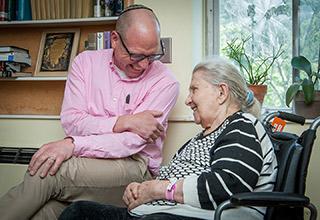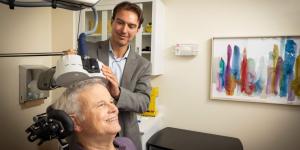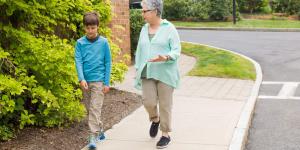Training Providers of Geriatric Health Care to be Spiritual Generalists
An interview with Hebrew Rehabilitation Center’s Director of Clinical Pastoral Education (CPE)

Rev. Mary Martha Thiel is the director of Clinical Pastoral Education (CPE) program at Hebrew Rehabilitation Center. In her role, she trains program participants of all faiths to provide spiritual guidance to senior residents and patients at Hebrew SeniorLife and beyond.
In conjunction with CPE, Rev. Thiel also works with health care providers at Hebrew Rehabilitation Center who do not have a ministry background on incorporating spirituality generality in their approach to care. I sat down with Rev. Thiel to learn more about the Spiritual Generalist Program and how it’s being put to use to help staff and patients alike.
What is the focus of the Spiritual Generalist Program (SGP) at Hebrew SeniorLife (HSL)?
The program will offer Clinical Pastoral Education to our health care providers who are not chaplains and want to incorporate spiritual care into the practice of their own disciplines.
The program will give our frontline caregivers—from aides to physicians—tools and language to increase their comfort with the world of religion and spirituality within their own disciplines. So many caregivers know that the intersection of health care and spirituality is really important, but they’ve never been trained in how to incorporate spiritual counseling into their practice. They don’t know where to begin.
What is the genesis of the program?
I helped develop a program at Boston Children’s Hospital called “On Being a Spiritual Generalist,” which was wildly successful. Those that participated were energized by working across disciplines and were really “jazzed” about doing their own work again. The one-day workshop helped clinicians learn about, and assume, their appropriate role as spiritual care generalists, while appreciating the specialist role of chaplains. We are adapting this program that has been so successful in pediatric care to our setting in geriatric care.
What do the workshops look like?
Clinicians tend to see the spiritual side of their patients when it’s expressed religiously, but not when it shows up in secular ways. We use multiple modalities of learning. One of them is realistic enactment. There is a whole movement in health care education that uses actors to illustrate real world situations caregivers may encounter.
The SGP curriculum provides a spiritual screening tool that helps caregivers see how spirituality might show up in patients and their families in religious and secular ways. We have developed three scenarios for this day of training. The first two scenarios relate to spiritual care that a spiritual generalist might provide. Participants will play themselves, engage with and then get feedback from the actors.
The third enactment illustrates how spiritual care plays out at a chaplain’s level. It’s designed to let clinicians see what a chaplain does, which most don’t get to see because we tend to do our work quietly behind closed doors. They can see the difference between what a generalist does and what a specialist does.
What are the benefits of the program?
We’re hoping to have participants from diverse disciplines. Everyone on the frontline of caring for patients and their families has a role to play. We don’t choose where and when bonds actually develop with our patients and their families. The patients and families do.
This training helps deepen relationships between caregivers and their patients. The program will help our caregivers confront many issues that our patients and their families face—issues of belonging, respect, dignity, meaning, purpose, boredom, depression, and legacy among them. The more deeply connected caregivers can feel to their patients – who they are, what their values are—the better the quality of care.
It’s important that caregivers respect boundaries when caring for patients from different religious backgrounds and traditions. Sometimes caregivers with strong religious perspectives may overreach when trying to provide comfort to patients, using language that doesn’t fit with how their patients express their personal religious or spiritual beliefs. The training we do helps caregivers set boundaries and understand that they always have to be sensitive to the patient’s spiritual worldview, while understanding that there are universal concerns that their patients confront—ones of hope and love— those things that are very important to all of us across traditions. We never want staff to be forcing their own religious view on patients.
When it comes to existential questions and issues of well-being, it’s really useful for all caregivers to have a little of our training as chaplains. If the patient is more comfortable getting spiritual counsel from a social worker it’s so much more effective to work with the social worker rather than work against the chaplain. Just as it’s very useful for us as chaplains to be generalists in social work and know when we really need to refer a patient to a social worker. The basic model that we work with is that everyone needs to be a generalist on some level in everyone else’s discipline—enough to know when to refer the patient to the appropriate provider for care.
What is your hope for the future of the program?
Our Spiritual Generalist workshops at HSL are being funded by the Josiah Macy, Jr., Foundation, through a gift to Brandeis University with Wendy Cadge as Principal Investigator. Wendy Cadge is one of the leaders of the national initiative Transforming Chaplaincy. We benefit because we are providing the test site for the study. My hope is that we can find more funds to continue the program. The biggest task in initiating the program is in rewriting the curriculum, getting the actors, and putting the program in place. Once we set it up, it does not cost a lot of money to keep it going. And, it fits so well with HSL’s mission to transform the experience of aging.
You needn’t be a chaplain or health care provider to contribute to the well-being of patients in our care. Visit our Hospice Volunteer Opportunity page to find out how you can become a Hebrew SeniorLife Hospice Care volunteer.
Blog Topics
Learn More
Spiritual Care Education
Hebrew SeniorLife's Clinical Pastoral Education program provides geriatric-focused spiritual care training for seminary students of many faiths, future clergy seeking spiritual care skills, and aspiring or current health care chaplains.

Spiritual Care Programs
Spiritual care programming is an important part of life on every Hebrew SeniorLife campus, with a full team of interfaith chaplains available to connect each resident, patient, and family member with the spiritual resources that resonate most for them.



